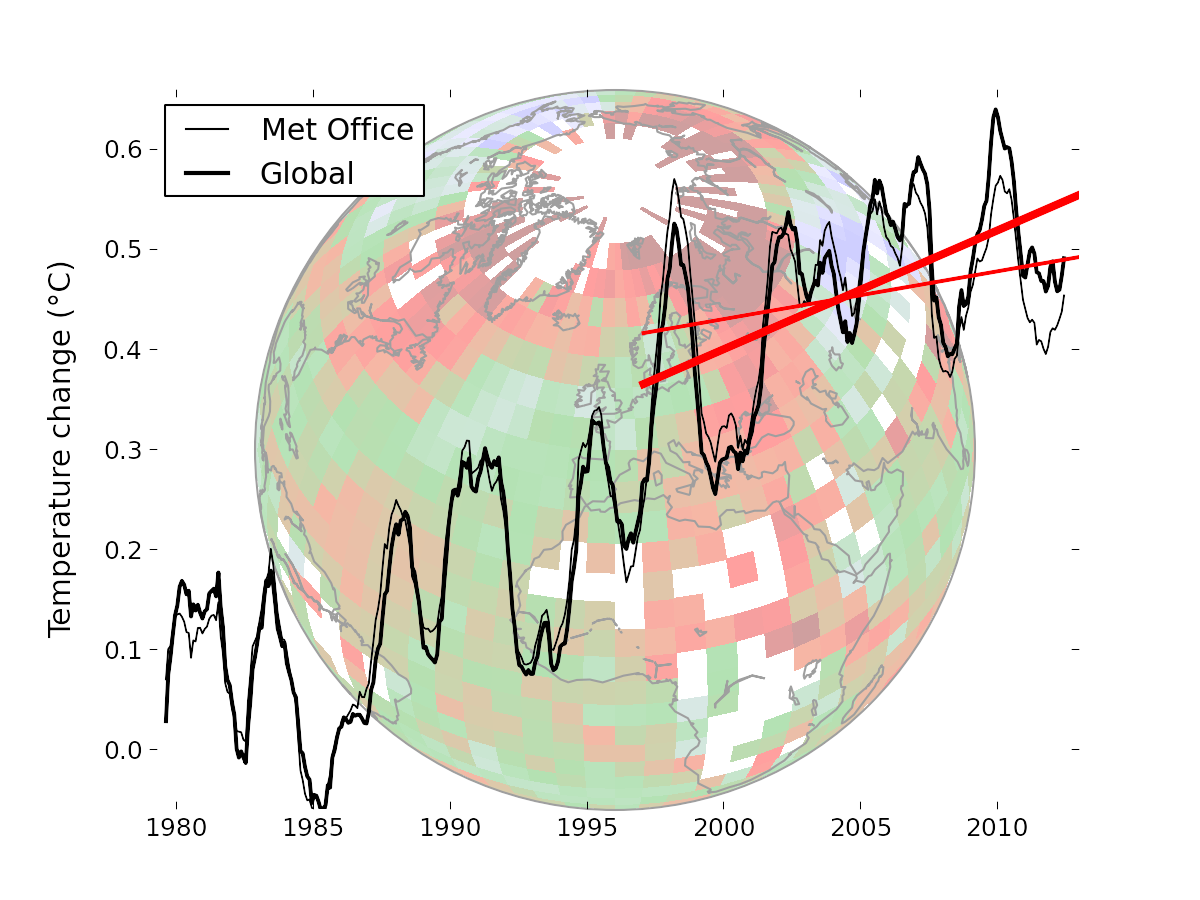Environment & Energy
Related: About this forumGlobal Warming Since 1997 Underestimated by Half
...
It sounds obvious and simple, but it’s not. Firstly, the satellites cannot measure the near-surface temperatures but only those overhead at a certain altitude range in the troposphere. And secondly, there are a few question marks about the long-term stability of these measurements (temporal drift).
Cowtan and Way circumvent both problems by using an established geostatistical interpolation method called kriging – but they do not apply it to the temperature data itself (which would be similar to what GISS does), but to the difference between satellite and ground data. So they produce a hybrid temperature field. This consists of the surface data where they exist. But in the data gaps, it consists of satellite data that have been converted to near-surface temperatures, where the difference between the two is determined by a kriging interpolation from the edges. As this is redone for each new month, a possible drift of the satellite data is no longer an issue.
...
But after filling the data gaps this trend is 0.12 °C per decade and thus exactly equal to the long-term trend mentioned by the IPCC.

http://www.realclimate.org/index.php/archives/2013/11/global-warming-since-1997-underestimated-by-half/
Incomplete global coverage is a potential source of bias in global temperature reconstructions if the unsampled regions are not uniformly distributed over the planet's surface. The widely used HadCRUT4 dataset covers on average about 84% of the globe over recent decades, with the unsampled regions being concentrated at the poles and over Africa. Three existing reconstructions with near-global coverage are examined, each suggesting that HadCRUT4 is subject to bias due to its treatment of unobserved regions.
Two alternative approaches for reconstructing global temperatures are explored, one based on an optimal interpolation algorithm and the other a hybrid method incorporating additional information from the satellite temperature record. The methods are validated on the basis of their skill at reconstructing omitted sets of observations. Both methods provide superior results than excluding the unsampled regions, with the hybrid method showing particular skill around the regions where no observations are available.
Temperature trends are compared for the hybrid global temperature reconstruction and the raw HadCRUT4 data. The widely quoted trend since 1997 in the hybrid global reconstruction is two and a half times greater than the corresponding trend in the coverage-biased HadCRUT4 data. Coverage bias causes a cool bias in recent temperatures relative to the late 1990s which increases from around 1998 to the present. Trends starting in 1997 or 1998 are particularly biased with respect to the global trend. The issue is exacerbated by the strong El Niño event of 1997-1998, which also tends to suppress trends starting during those years.
http://onlinelibrary.wiley.com/doi/10.1002/qj.2297/abstract
This is important.
kristopher
(29,798 posts)Thanks for sharing.
muriel_volestrangler
(101,294 posts)Scientists from Germany's Alfred Wegener Institute (AWI) analysed temperature data from the Greenland Sea between 1950 and 2010.
Their results show that during the past 30 years water temperatures between two kilometres deep and the ocean floor have risen by 0.3 degrees Celsius.
...
"The amount of heat accumulated within the lowest 1.5 kilometres in the abyssal Greenland Sea would warm the atmosphere above Europe by 4 degrees Celsius," she said.
http://www.abc.net.au/news/2013-11-02/deep-greenland-sea-is-warming-ten-times-faster-than-global-ocean/5065856
LouisvilleDem
(303 posts)I hope that others are able to replicate these results.
NickB79
(19,233 posts)Previously this year, the "pause" in warming was blamed on excess heat going into the oceans. Now it turns out there wasn't even a real pause, but rather bad sampling data. The planet has continued to heat up all this time.
Doesn't that mean the models far UNDERESTIMATED the true amount of warming, if both lines of research turn out to be true?
Nihil
(13,508 posts)> Doesn't that mean the models far UNDERESTIMATED the true amount
> of warming, if both lines of research turn out to be true?
![]()
And we will all go together when we go.
What a comforting fact that is to know.
Universal bereavement,
An inspiring achievement,
Yes, we all will go together when we go.
Yes, definitely a bit of Lehrer required to accompany that cheery thought!
![]()